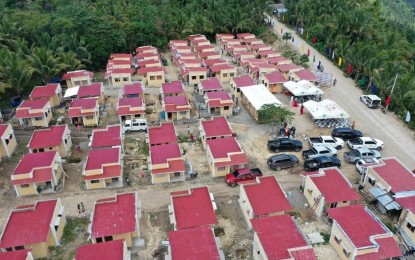
(File photo)
MANILA – Part of the Philippine housing sector's "priority thrust" this year is pushing for efficient Post-Disaster Shelter Recovery Policy Framework (PDSF), which intensifies its assistance to disaster-affected Filipinos.
Department of Human Settlements and Urban Development (DHSUD) Secretary Eduardo del Rosario cited the crucial roles of its key shelter agencies (KSAs) to implement a more effective post-disaster shelter recovery program.
For the past two years, del Rosario cited various disasters that have hampered the DSHUD's operations nationwide.
“While we are still reeling from the unprecedented impact of the pandemic, there is the Taal Volcano eruption and several catastrophic typhoons hitting the country like Typhoons Ulysses, Rolly, and Quinta in 2020. We were slowly recovering last year and adjusting to the new normal, but in December we were again hit by another catastrophe - Typhoon Odette which severely damaged major cities and tourist destinations in the south, and destroyed far more houses than Super Typhoon Yolanda,” del Rosario noted in a recent National Human Settlements and Urban Development Coordinating Committee (NHSUDCC) meeting.
The PDSF, which was jointly crafted by the Public Housing and Settlement Service of DHSUD and the World Bank (WB), has to be strengthened, making sure that there will be a consistent approach among KSAs and other government agencies when assisting calamity-hit areas to better help disaster-affected areas.
The PDSF is aimed to support the country’s overall shelter development and financing policies and strategies.
Del Rosario also sees the PDSF can contribute to larger social and economic development goals, including disaster risk reduction in the future, restoration of livelihoods, and poverty reduction.
It likewise serves as a systematic approach to managing shelter recovery programs and determining activities that will improve the country’s management and readiness for future recovery programs.
Under PDSF policy, the DHSUD and the Washington-based multi-lender institutes will be rebuilding around 300,000 housing units, damaged by natural or man-made calamities, every year.
Del Rosario earlier cited the need to intensify collaboration and synchronize efforts among key players and stakeholders within the housing sector, to fast-track delivery of services to the disaster-hit families, particularly those with destroyed houses due to unforeseen calamities.
“As we implement our programs, let us draw lessons from our experience in the past disasters, let us not repeat past mistakes, but innovate to expedite the delivery of better quality housing services for calamity victims,” he said.
Del Rosario emphasized the need to further expand proper land use and urban planning development, particularly in a disaster-prone country such as the Philippines, to mitigate the occurrence of disasters.
"As the lead agency in land use and urban planning and management, it is now our responsibility to guide and manage future developments to ensure resilience and sustainability through proper coordination with other government agencies, LGUs (local government units) and other stakeholders," del Rosario said.
The DHSUD's regional offices in coordination with various LGUs nationwide were tasked to update their respective Comprehensive Land Use Plans and Local Shelter Plans, in pursuit of providing better quality housing services for calamity victims. (PNA)
